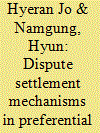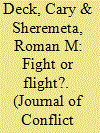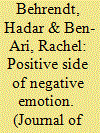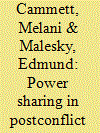|
|
|
Sort Order |
|
|
|
Items / Page
|
|
|
|
|
|
|
| Srl | Item |
| 1 |
ID:
115728


|
|
|
|
|
| Publication |
2012.
|
| Summary/Abstract |
Previous studies have attested to leaders "coup-proofing" their regimes by reducing the ability or disposition of their armies to seek their removal. The following article tests the utility of these efforts. "Structural" coup-proofing such as counterbalancing is expected to reduce the ability to organize a coup plot by creating substantial coordination obstacles to soldiers. Coup-proofing by spoiling militaries with organizational resources is expected to reduce the willingness to intervene. However, increased organizational resources are expected to increase the army's capabilities, thereby increasing the likelihood of a coup's success. The theory is empirically tested using a selection model with a global sample from 1961 to 2000. Findings suggest that both coup-proofing strategies are effective deterrents of coup activity and, more generally, that characteristics of the military appear to be far more important than economic influences on coups.
|
|
|
|
|
|
|
|
|
|
|
|
|
|
|
|
| 2 |
ID:
115729


|
|
|
|
|
| Publication |
2012.
|
| Summary/Abstract |
Preferential trade agreements (PTAs) have increased dramatically in the past several decades and play an important role in the global economy. Dispute settlement mechanisms (DSMs) in these international agreements significantly influence their functioning. In this article, the authors seek to understand what factors determine the legal arrangements of these mechanisms. The authors argue that the confluence of domestic political regime type, emulation incentives, and the development of the multilateral trade regime determines their legal dimension. Using a data set of PTAs between 1957 and 2008, the authors show that (1) democracies are more likely than autocracies to prefer moderately strict DSMs, (2) trading partners increasingly emulate each other by adopting similar legal templates, and (3) the recent trend against legalistic mechanisms is largely driven by the development of the multilateral trade regime. Their findings have important implications for the design of international institutions by highlighting the importance of member-specific as well as macro-level factors.
|
|
|
|
|
|
|
|
|
|
|
|
|
|
|
|
| 3 |
ID:
115730


|
|
|
|
|
| Publication |
2012.
|
| Summary/Abstract |
This article examines theory and behavior in a two-player game of siege, sequential attack and defense. The attacker's objective is to successfully win at least one battle, while the defender's objective is to win every battle. Theoretically, the defender either folds immediately or, if his valuation is sufficiently high and the number of battles is sufficiently small, then he has a constant incentive to fight in each battle. Attackers respond to defense with diminishing assaults over time. Consistent with theoretical predictions, the authors' experimental results indicate that the probability of successful defense increases in the defenders valuation and it decreases in the overall number of battles in the contest. However, the defender engages in the contest significantly more often than predicted and the aggregate expenditures by both parties exceed predicted levels. Moreover, both defenders and attackers actually increase the intensity of the fight as they approach the end of the contest.
|
|
|
|
|
|
|
|
|
|
|
|
|
|
|
|
| 4 |
ID:
115732


|
|
|
|
|
| Publication |
2012.
|
| Summary/Abstract |
Two studies examined the effects of guilt and shame on coping with situations of interpersonal conflict. The first study used quantitative self-report measures to evaluate the relationship between guilt-proneness and shame-proneness and conflict coping style. The second study content-analyzed participants' narrative reports of interpersonal conflicts to evaluate the distinguishing characteristics of guilt versus shame, and the causal relationship between state guilt and shame and styles of coping with conflict. Findings highlight the characteristics of guilt and shame that may explain their differential influence on coping. Theoretical contributions and applications for conflict resolution and mediation are discussed.
|
|
|
|
|
|
|
|
|
|
|
|
|
|
|
|
| 5 |
ID:
115727


|
|
|
|
|
| Publication |
2012.
|
| Summary/Abstract |
Which components of power sharing contribute to the duration of peace and what explains the linkages between institutional design and stability? The authors argue that certain types of political power sharing are associated with more durable peace than others, primarily through their positive effects on governance and public service delivery. In particular, closed-list proportional representation (PR) electoral systems stand out among power-sharing arrangements, due to their ability to deliver superior governance outcomes which, in turn, can promote stability by undercutting the initial motivations for conflict or by reducing the feasibility of rebellion. The authors argue that these positive outcomes result from closed-list PR's ability to increase party discipline and checks on executive power, while reducing incentives for personalistic voting. The introduction of political institutions in postconflict negotiated settlements allows us to test the independent effects of institutions on governance and stability using survival analysis and a case study.
|
|
|
|
|
|
|
|
|
|
|
|
|
|
|
|
| 6 |
ID:
115731


|
|
|
|
|
| Publication |
2012.
|
| Summary/Abstract |
This study examined the contribution of verbal behavior to the creation of rapport in negotiation, while methodologically addressing the issue of dependence between dyadic measures, which is inherent to the concept of rapport, with the Actor-Partner Interdependence model. The approach adopted is substantially different from that of past research, which emphasized the contribution of nonverbal behavior to rapport and used averaged rapport to asses it. Drawing both from the theoretical concept of rapport and from Politeness theory, the authors developed the Verbal Rapport Assessment scale. The authors found that rapport is indeed encoded in the verbal behavior and that various verbal behaviors contribute to negotiators' sense of rapport, as well as to the judgment of negotiators' rapport behaviors. Likewise, the authors found that a negotiator's sense of rapport was primarily affected by his partners' verbal behavior and by the interaction between behaviors of both sides. These findings emphasize the importance of the verbal channel and the dyad in creating rapport in negotiation. Negotiation in the twenty-first century is often characterized by exclusively verbal interactions (via telephone, chat, and e-mails); negotiators from many different fields can benefit from these findings.
|
|
|
|
|
|
|
|
|
|
|
|
|
|
|
|
| 7 |
ID:
115726


|
|
|
|
|
| Publication |
2012.
|
| Summary/Abstract |
The treatment of prisoners varies enormously across wars. Why are some prisoners horribly abused, while others are cared for humanely? The author argues key attributes of the belligerents, alongside the nature of the conflict itself, provides the most convincing explanation for differences in prisoner abuse. Democratic norms and domestic institutional incentives lead democracies to exhibit more restraint when dealing with prisoners. On the other hand, states caught up in drawn-out wars of attrition, or those seeking territorial conquest, are much more likely to resort to prisoner abuse. The author tests this argument against a variety of common alternative explanations using a new data set on prisoner abuse across all interstate wars from 1898 to 2003. The author finds strong support for the role of both the regime type and the nature of the conflict, while the results also suggest several points of difference from existing research on wartime conduct.
|
|
|
|
|
|
|
|
|
|
|
|
|
|
|
|
|
|
|
|
|